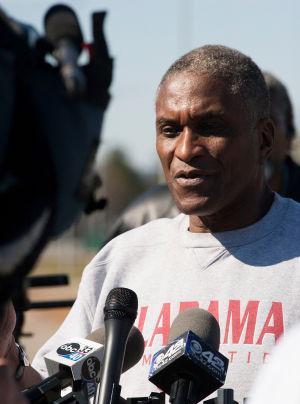
Johnny Ford
Tuskegee Mayor Johnny Ford and five other residents of Macon County have filed a federal lawsuit alleging Alabama Attorney General Luther Strange has caused "economic devastation" by unlawfully closing the VictoryLand casino.Plaintiffs claim they and other Macon County voters have been the victims of a Republican Party plan that involves the use of Indian gaming funds to help take over all three branches of the Alabama government. The scheme, plaintiffs state, essentially nullifies their lawful votes to allow electronic bingo at VictoryLand.
Macon County is home to historic Tuskegee Institute, which was founded by Booker T. Washington and featured George Washington Carver as perhaps its most noted teacher.
The lawsuit, which names Strange and Governor Robert Bentley as defendants, alleges multiple violations of the U.S. Voting Rights Act, resulting in discrimination against residents of a county that is almost 82 percent black. Plaintiffs seek a declaration that Strange's actions constitute voting-rights violations, an injunction against future law-enforcement raids in Macon County, and a return of property seized at VictoryLand. (The full complaint can be viewed at the end of this post.)
Ford held a press conference on April 5 to announce filing of the lawsuit, but the mainstream Alabama press largely has ignored the story. We found reports at The Tuskegee News, the Opelika-Auburn News, and Courthouse News Service. But we found no coverage in newspapers serving Alabama's four largest cities--the Montgomery Advertiser, plus al.com newspapers in Birmingham, Mobile, and Huntsville.
How can so-called news organizations ignore a story that raises weighty, constitutional matters? It's hard to fathom an answer, but it certainly is not because the lawsuit deals only with bingo. At its heart, the lawsuit alleges a conspiracy between Indian tribes and white Republicans to deprive black Alabamians of constitutional protections.
Donald LaRoche, of Brockton, Massachusetts, and Christopher Ford, of Tuskegee, serve as co-counsel for plaintiffs. The lawsuit is supported by exhibits that are about 10 inches thick, sources tell Legal Schnauzer. From the complaint:
Beginning in 2003, white political leaders of the Alabama and National Republican Party . . . , including but not limited to Governor Bob Riley, initiated plans to elect white Republicans to the Executive, Legislative, and Judicial branches of government in the State of Alabama, allegedly referred to as "Operation 2010."
In order to raise funds to accomplish their goal, Alabama Republican leaders and elected officials entered into a scheme with the Mississippi Choctaw Indians Casino Operators . . . and later the Alabama Poarch Band of Creek Indian Casino Operators. . . .
This scheme included eliminating competition to Indian Gaming from non-Indian Gaming, including "VictoryLand" located in Macon County, Alabama. Eliminating VictoryLand served the dual goals of both by providing Indian Gaming a monopoly in Alabama and shutting off potential non-Indian Gaming . . . contributions that Republican political leaders feared could be used to thwart their political plans.
Plaintiffs go on to describe what amounts to a massive money-laundering operation at the national level:
The Choctaws, and later the Poarch Creeks, were able to disguise millions of dollars of contributions through Republican-based nonprofit organizations, including but not limited to, the National Christian Coalition, the Alabama Christian Coalition, the Alabama-based Republican Governors' Association and other Republican-based Political Action Committees ("PACs").
Indian Gaming funds were disguised in this manner to hide from the Alabama electorate that Republican candidates, whom they believed were opposed to all forms of gambling, were in fact taking millions of dollars from Indian Gaming.
Why has the mainstream Alabama press refused to cover this story? Perhaps the answer can be found in the complaint, which offers a brief recitation of our state's sad history with politics and racism. Such ugliness, the complaint suggests, continues today--based on evidence presented at the Alabama bingo prosecution of 2011. Once again, it seems, federal intervention is required to enforce basic constitutional rights in the Deep South:
The State of Alabama has a long history of utilizing the state constitution and the power of central state government to deny African Americans in Black Belt counties, such as Macon County, the ability to govern themselves and to make and to enforce laws of their choice. . . .
This Court uncovered more recent attempts to deny African Americans in Black Belt counties the ability to govern themselves and to make and to enforce laws of their choice when it found "clear evidence of political manipulation motivated by racism." Two white Republican Senators and other white "influential Republican legislative allies" were recorded discussing their political strategy to keep a proposed constitutional amendment off the ballot because: "Every black, every illiterate would be bused on HUD financed buses." The recordings took place in the office of a white Republican state legislator in the Alabama Statehouse. This Court determined that: "The [white Republican Senators'] recordings present compelling evidence that political exclusion through racism remains a real and enduring problem in this State. Today, while racist sentiments may have been relegated to private discourse rather than on the floor of the state legislature . . . it is still clear that such sentiments remain regrettably entrenched in the high echelons of state government."
The Macon County lawsuit shines new light on racism in high places--and the Alabama mainstream press clearly wants no part of telling that story.
Macon County Lawsuit Re Luther Strange by Roger Shuler
